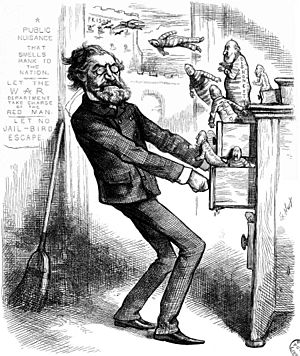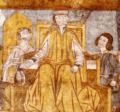Corruption facts for kids
Corruption is a big word that means being dishonest or unfair, especially when someone in power uses their position for personal gain instead of helping others. It's like when someone breaks the rules or acts selfishly, even when they are supposed to be trustworthy.
In general, corruption means being spiritually or morally impure, or straying from what is right and good. In business, it can mean getting paid for services or things you aren't legally supposed to receive, like taking a bribe or a kickback. When it comes to government, corruption happens when elected officials make decisions based on their own selfish interests, or the interests of a few powerful people, instead of what's best for everyone.
Contents
Understanding Corruption
Corruption can show up in different parts of society. Let's look at how it affects politics and police work.
Corruption in Politics
Political corruption is when people in public office, like politicians, use their power, position, or public money for their own benefit. This can happen through things like extortion, asking for bribes, or offering bribes to others.
Sometimes, politicians might try to stay in office by using taxpayer money to buy votes, perhaps by creating laws that benefit certain groups in exchange for their support. When corruption is widespread and affects an entire political or economic system, it's called systemic corruption. This means the whole system is deeply affected by dishonest practices.
Corruption in Police Work
Police corruption is a specific type of wrongdoing where police officers use their position to get money, personal benefits, or career advantages. They might do this by not investigating certain crimes, or by only investigating some, in exchange for bribes.
For example, a common type of police corruption is when officers ask for or accept bribes so they don't report illegal activities they find. Another example is when police officers break their own rules or code of conduct to make sure someone is found guilty, like by using falsified evidence.
In rare cases, police officers might even be involved in organized crime themselves. To fight against this, most big cities have special departments called internal affairs. These departments investigate police officers who are suspected of corruption or other misconduct. In the UK, there's a similar group called the Independent Police Complaints Commission.
Related pages
Images for kids
-
The headquarters of Petrobras in downtown Rio de Janeiro.
-
How the shadow economy has changed in (West-) Germany from 1975 to 2015.
See also
 In Spanish: Corrupción (abuso de poder) para niños
In Spanish: Corrupción (abuso de poder) para niños
 | Kyle Baker |
 | Joseph Yoakum |
 | Laura Wheeler Waring |
 | Henry Ossawa Tanner |









